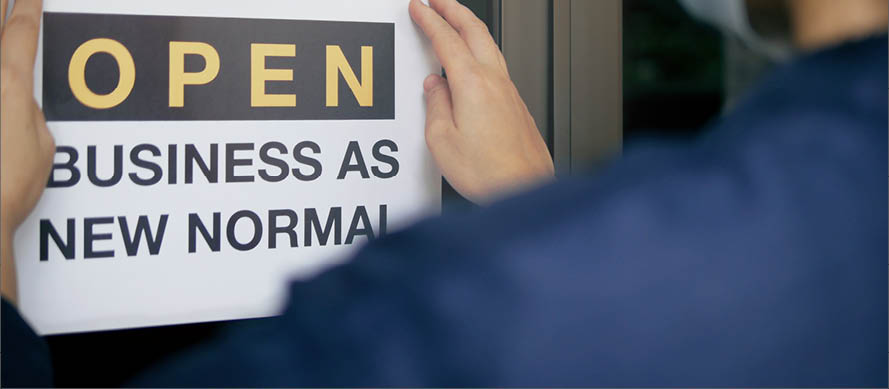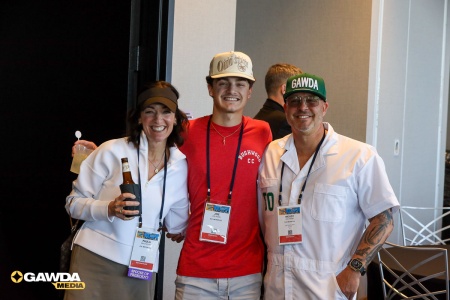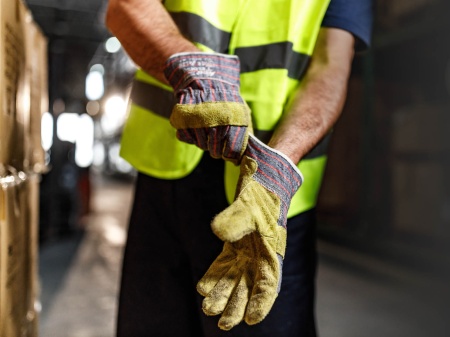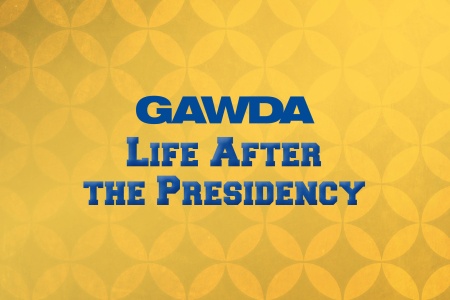How COVID-19 has impacted GAWDA members and what will need to be done as businesses reopen.
By Steve Guglielmo, Tom Badstubner, Marilyn Dempsey, Michael Dodd and Rick Schweitzer
By the time that this issue hits your desk, it might feel like the COVID-19 pandemic has lasted forever. It may even be that the economy in your state has largely reopened. But the fallout from this crisis will last far beyond the initial lockdown and reopening. And, though businesses may have returned to some semblance of normalcy, the virus has not been eradicated. We may deal with a “second wave” or, at the very least, will need to continue to have protocols in place to protect our employees from contracting the virus even in a largely reopened economy. The GAWDA Consultants have been doing webinars and roundtables with members since the pandemic started. For this issue, Welding & Gases Today had the opportunity to speak with these consultants about how the pandemic has impacted members and how members should be preparing for a reopened business climate.
We spoke with GAWDA’s newest consultant, Marilyn Dempsey, who advises members on topics related to DHS, EPA and OSHA, Michael Dodd, GAWDA’s DOT Consultant, Tom Badstubner, GAWDA’s FDA and Medical Gases Consultant, and Rick Schweitzer, GAWDA’s Government Affairs and Human Resources Consultant. The following is a transcript of a conversation regarding training best practices.
Rick Schweitzer: I think the biggest change has been the rapidity of new information that has come out. The news cycle has gone from weeks to hours or minutes. You get something from the government, and you want to get it to the members immediately. The GAWDA staff has been very good, Andrea Levy has been wonderful about putting together all of these safety alerts that we have all cobbled from government recommendations and exemptions and other information that comes out and we’ve been doing it on a daily basis. Or, at least we were for the first month or so. It has slowed down some now. That’s why we’ve been doing these teleconferences, because the amount of new information on this subject has been unprecedented.
Welding & Gases Today: I assume that goes the same for everybody on this call. But, specifically, as it pertains to your relevant agencies, are you seeing an increase in questions relating specifically to those agencies?
Marilyn Dempsey: I still get some of the basic questions: How do you clean a cylinder or how do we protect our employees? But, because of what we’re putting on these webinars and starting to stress things like facility emergency response plans and hazard communication, I’m getting more questions on those subjects. People are starting to think about the broader picture. I know we’re bringing in other topics on the calls. Mike has brought in topics on the DOT and I’ve talked about how we might be in the middle of this plague, but we still have to worry about the weather that is coming up. Hurricane season is just around the corner.
You can tell where people are in this cycle. There are some people who are at the beginning of the cycle and some people who are thinking, “We’ve reached the peak and we’re coming back down and now I’m ready to move on to how to expand and really make a good foundation.”
Tom Badstubner: The issues of handwashing and equipment cleaning are the number one and two issues that we’ve been discussing. That’s really more about personnel safety than it is about medical gas safety. Early in the pandemic, there were some Safety Alerts about converting cylinders that came from the Compressed Gas Association (CGA SA-35, Cleaning Of Cylinders Returned From Healthcare Facilities During A Pandemic and CGA SA-36, Medical Oxygen Supply System Issues During The COVID-19 Crisis.) But, by far, the biggest issues have been hand sanitizing and equipment cleaning.
WGT: For each regulatory agency, there have been many alerts issued pertaining to COVID-19. But Marilyn, as you mentioned, the world doesn’t stop spinning during this time. How is regulatory enforcement being handled during this crisis?
Michael Dodd: It’s way down.
Marilyn: It is. But it’s surprising that there are still a couple of twinges. A lot from letters that came out earlier in the year, but it seems like Homeland Security has a good handle on this and so they’re looking at things and saying, “Oh, this person might need to file a Topscreen.” Within the last couple of weeks, I’ve had three little DHS issues that have come up.
Michael: The out in public enforcement, roadside stops, etc. has almost shut off. I’m getting no calls on that. I have had a new twist though, in the last month, I’ve had two DOT audits being conducted by phone. Phone and email and online. That’s a new twist.
Tom: The FDA sent a notice out that they’re not sending inspectors into plants right now for routine inspections. So, there really has been no significant enforcement. But my impression is that there has been good compliance, even without the enforcement. I’m not aware of anybody that has taken this as an opportunity to not follow GMPs.
WGT: How is the preparation process different for a phone or online audit than if they just show up at your door? If this goes on for longer than we think that it might and that becomes more of the norm, what should members do differently?
Michael: Really nothing different. Because all they’re doing is asking people to scan things and send to them via email. So, it’s making the audit process, to me, go from a day or two to a week or two. But the questions are the same.
Rick: Mike, are you seeing any situations where they’re having the company walk around to take videos of their facility and processes or anything?
Michael: I keep waiting for that to happen. It has not been requested yet. But I think that’s a natural next step.
Rick: That’s what I’m guessing, too.
WGT: I’m up in New York, so we have sheltered in place. But there are states that did not go to that extreme, where it was a mandated order. In those states, where things have remained open, to a certain extent, are in-person audits still happening at all? Or has that tap been completely shut off?
Michael: I don’t know of a single in-person audit since this has started.
Tom: Same with the FDA. I haven’t heard a single one. However, there have been surveys from the FDA that may replace audits or possibly, prepare the inspectors for audits. The purpose of the surveys is unclear.
WGT: Once things go back to “normal,” what do you think that is going to mean for that? Will there be a huge backlog? Will things get pushed way out into 2021?
Michael: I’m just guessing, but I think once they figure out this online questionnaire type audit, I think they’re going to find that that is probably more effective, because they can visit more people more easily. They won’t have the travel expenses or the time out of the office. I think it’s going to be a real slow rollback in to in-person. And maybe more a ramp up of the electronic.
WGT: With a lot of our industry having been deemed as “essential business,” it has been more or less “business as usual” with obvious caveats. How does that change things in terms of following the protocols that have been put in place? Does that change anything as compared to an industry that might not be an essential service?
Michael: I’ve been doing an impromptu survey among friends, asking how their business has been doing. So far, the average has been 1/3 to 50% off. And they were doing great up through February and March. But in the past month, they’ve actually seen 1/3 to 1/2 of their business go away. With everybody sheltering in place, I haven’t been going to visit places. I honestly think that businesses are struggling so much at the moment with maintaining their business and their employees and doing what they can to help their employees through this, that training, I think, has fallen off the radar. In the last week, though, I have had a few inquiries about doing some virtual training. But it’s a very small percentage of normal. So, a concern that I would have, is that I’m hoping that the owners and the business operators remember that training still has to go on. There are still frequencies to meet. Right now, it’s just not a primary concern. I fully understand that. But, at some point, they’re going to have to get back in this program and back on a training schedule.
Tom: I haven’t had any of these kinds of conversations recently, but before that, the companies that were in the hardest hit area, like New York City, were reporting some higher than normal medical gas sales volume. But the companies in the rural areas, they were hit pretty hard. I think it might be uneven across our industry.
Michael: I would agree with that. Those areas that are being hit the hardest have seen medical business go through the roof. But, if you walk away from those metro areas, they’ve seen their medical business go to zero.
Tom: And the welding business has really suffered. So, if you had a lot of welding business and not much medical, this may have been a very tough time for you.
Michael: I know some medical people that, honestly, their medical business has gone to near nothing. Because the hospitals have shut down. The nursing homes and the rest care areas, they have made all of the patients stay in their rooms. So, they’re off of cylinder oxygen and on to concentrators. So, that has been quite a learning experience. And unexpected.
Tom: I talked to a member this morning who took this opportunity, while he had to shelter at home, to take some training that we offered (GAWDA Professional Compliance training). So, this member actually focused on training opportunities while he could.
Michael: I would hope that people right now, with business being slow and companies trying to maintain the number of employees at work, that they would take the opportunity to do some online training. Because now they actually have some time for it. Before, they were almost too busy to stop.
Marilyn: The question I get most is, “How do I clean cylinders?” or “How do I keep my employees safe?” I really think that there are people who want to take apart their entire plant and disinfect it. Let’s think about the exposure that this equipment actually has. And I try to walk them through that. And I think companies are really trying to focus on keeping things clean so that people don’t get sick.
WGT: Right now, it seems like businesses are in survival mode. They’re doing what they can do to maintain whatever business is left out there. But as we start transitioning back into a period of relative normalcy, it’s not as if those commitments have gone away. They’ve just been pushed down the priority list. At a certain point, companies need to start thinking about how to start operating and doing all the things that were left behind as they were just trying to survive. What are you seeing from businesses that are doing this well that you think might give them an advantage when the world snaps back?
Michael: I’m hoping that, from a training standpoint, when business starts snapping back in the third and fourth quarter that everybody doesn’t start lining up all at once. There’s only one of me. There’s a piece of me who thinks that is what is going to happen. Everybody is going to get back in business, get things back to normal, then they’re going to look at their business and say, “We’re six months out of training.” And everybody will come looking at once. We can do that via GoToMeeting vs. in person. And it’s unlimited, then, with the amount of people you can do at one time.
But without looking into the future too much, there’s a real concern that companies are dealing with right now. There’s a concern that people can’t get new drivers hired because the states have got all of the DMVs and testing facilities closed. Half of the country is shut down at the moment. So, they can’t bring on new drivers. The old ones can keep going, but the new ones can’t come on.
Rick: 22 states have their driver licensing agencies closed right now. You can take your written test over the Internet, but they don’t have a back office open, in some cases, to even process that information. You then can’t take the road test to get a new learner’s permit or a new commercial drivers license. And, even if you get one, you also have to have a background check done for your hazardous materials endorsement and if the state agency is not open to conduct that background check, then you have to go to another state that might have its driver licensing agency open to get your background check done. So, it has made it much more difficult to bring new drivers into the industry.
WGT: So that part of the business is just on hold indefinitely?
Rick: Yeah. And the other concern is that some drivers, at least initially, some were legitimately sick or had been exposed to other people who were symptomatic and therefore they had to quarantine themselves. Others were simply scared. They didn’t want to go to their customer’s sites. I’ve had members talk to me about, “What do I do with a driver who doesn’t want to go visit a particular customer” or, in one case, to go across the state line? These are new issues that we’ve never had to deal with before.
WGT: What was your piece of advice to that member?
Rick: Well, you have to talk to them about the specific risks involved and then try to take the fear of the unknown out of it. And make sure that they have adequate personal protective equipment and that the vehicle and the cylinders are wiped down as much as possible. So, then the driver can feel comfortable in making the delivery or the pickup.
Marilyn: I’ve had the same question posed to me. “I have a driver who doesn’t want to come to work because he’s afraid of being infected.” Like Rick said, you have to tell them that you’re taking every precaution you can. It’s not like it’s only one sector of the world that is impacted here. It’s everywhere. So just do everything possible to keep your people protected and work together to get through it. But you can’t force them.
WGT: Do you think that there has been anything that we’ve learned during this crisis that will carry on once things “go back to normal”?
Tom: I think we have an expectation or maybe a heightened sensitivity that our cylinders need to be clean when they return to be refilled. We are more aware of the potential risks we are facing. And that may mean more rigorously vetting our customers’ cleaning practices. We’ve discovered that some of the hospitals have been using non-CGA approved cleaning solutions for years. So, we may have more assertive conversations with our customers going forward than we’ve had in the past.
Marilyn: I think it’s also an opportunity for companies to show the added value of their salespeople. To have the salespeople really go in and find out, is there a cleaning protocol? Where are the cylinders being kept? And, to help keep our drivers from being exposed as much by streamlining the system both from our end and from the customer’s end.
WGT: What would your biggest piece of advice to readers during this crisis be?
Michael: One of my concerns is that we have had an awful lot of due dates pushed off. We’ve got cylinder testing pushed off, we’ve got CDL drivers licenses pushed off in the future, we’ve got medical carts pushed off in the future, drug and alcohol testing being pushed off. And, at some point here, they’re going to declare this emergency over, and everything is going to be immediately due. Unless they give us a phase-in period, which we have not heard about. My concern is going to be that there is going to be a whole lot of things due very fast right as businesses are trying to pick back up again. I think if I was an owner/operator or a compliance person, I would be keeping a real close tab on my due dates and how I’m going to phase this back in.
Tom: It might be a good time to do a self-assessment, like a mock audit, just to be sure that critical compliance activities have not dropped through the cracks.
Marilyn: I think the biggest thing that I have seen from people who are really excelling and truly being leaders is the communication that they have with every single one of their employees. They’re talking to people and talking to supervisors and coaching them on how to talk to people, really keeping the lines of communication open.
Rick: I think those are all really good points. I’m reminded of a conversation that I had with one member, which was that during emergency periods like this, you find out which of your employees you can really count on and which ones are problematic. And, at some point, after things return to whatever normal is going forward, it might be time to weed your garden.
Tom: I’d like to echo that. I’ve heard the same comment more than once. Rick is right, down the road when business picks back up and things start to get back to normal, I think people will remember who was a team player and who wasn’t.
WGT: Is there anything we didn’t touch on that you want to discuss today?
Michael: Just a personal wish that I want this business to get back to work. We have to get the country back to work. I hope we have learned some real lessons with this so that we don’t have to go through this again.
Marilyn: Especially in the Fall.
Tom: We’re going to have crises in the future. Whether it’s hurricanes or another COVID, but I think that we have, at least I’ve discovered, that our historical ways of doing business and making decisions and our old systems, just aren’t adequate for the future. We’re not able to respond smoothly. Maybe some of our work practices or management practices need to be looked at as well.
Rick: One thing that has been different about this is that hurricanes, tornadoes, floods, those are things that you can see, you can visualize, and people jump in and get to work. This was invisible and we can’t go to work. We don’t know how to fight it. So, this one is really different.
Tom: I think that Abydee recognized that the members had questions and the consultants had some answers, but we needed to get them out in a different, more effective way. I know that the questions that I took in those couple of weeks in March were about four times what the average was. And that is not really sustainable. Trying to do business the old way and communicate with people the old way. So, I think that the Consultant Webinars were one example of something that was a response to a need that was a little bit different. That will change as the urgency gets less. But we need to be open to new ways of doing things. And I think that all of GAWDA, including the members, are pretty flexible and forward-thinking about that. It was kind of a wakeup for me. We were pretty comfortable with how we did business before and we really shouldn’t have been.







